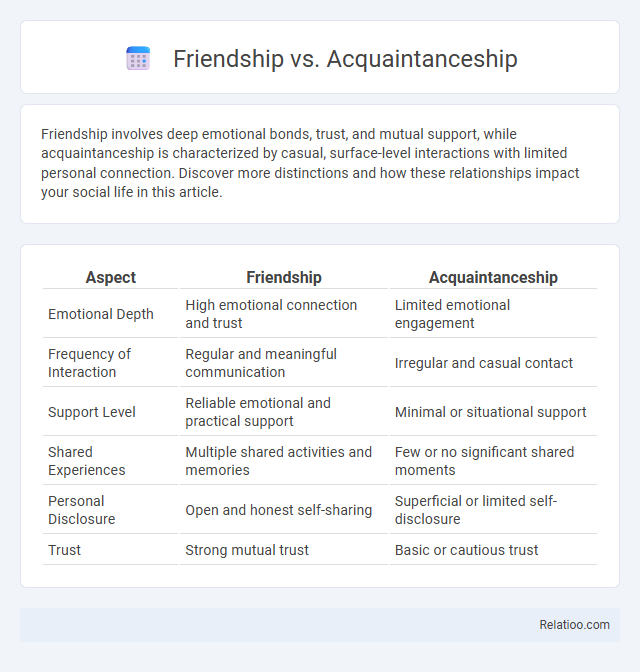Friendship involves deep emotional bonds, trust, and mutual support, while acquaintanceship is characterized by casual, surface-level interactions with limited personal connection. Discover more distinctions and how these relationships impact your social life in this article.
Table of Comparison
| Aspect | Friendship | Acquaintanceship |
|---|---|---|
| Emotional Depth | High emotional connection and trust | Limited emotional engagement |
| Frequency of Interaction | Regular and meaningful communication | Irregular and casual contact |
| Support Level | Reliable emotional and practical support | Minimal or situational support |
| Shared Experiences | Multiple shared activities and memories | Few or no significant shared moments |
| Personal Disclosure | Open and honest self-sharing | Superficial or limited self-disclosure |
| Trust | Strong mutual trust | Basic or cautious trust |
Defining Friendship vs Acquaintanceship
Friendship is characterized by mutual trust, emotional support, and deep personal connection, whereas acquaintanceship involves casual interactions without significant emotional investment. Friendships often develop over time through shared experiences and vulnerability, distinguishing them from superficial acquaintances. The process of forging refers to intentionally building or strengthening relationships, bridging the gap between acquaintanceship and true friendship.
Key Characteristics of True Friendship
True friendship is characterized by mutual trust, deep emotional connection, and consistent support, distinguishing it from acquaintanceship, which is often limited to casual interaction and superficial knowledge. Forging a genuine friendship requires time, vulnerability, and shared experiences that build a solid foundation beyond mere familiarity. Key attributes include loyalty, empathy, and reliable presence during both joyful and challenging times.
Recognizing an Acquaintance
Recognizing an acquaintance involves identifying casual connections characterized by limited interaction and emotional depth, unlike friendships that exhibit trust and meaningful bonding. Acquaintances often share specific social or professional contexts without the reciprocal support and intimacy found in forged relationships. Your ability to distinguish these relationships helps prioritize meaningful interactions and manage social expectations effectively.
Emotional Depth: Friends or Acquaintances?
Friendship involves a profound emotional depth characterized by trust, vulnerability, and mutual support, while acquaintanceship remains surface-level with limited personal sharing and emotional investment. Forging a friendship requires consistent interaction and genuine connection, transforming acquaintances into trusted confidants over time. Emotional intimacy in friendships fosters resilience and psychological well-being, distinguishing them sharply from the casual and often transactional nature of acquaintanceships.
Trust and Loyalty in Relationships
Friendship is characterized by deep trust and unwavering loyalty, often built over time through shared experiences and emotional support. Acquaintanceship involves limited trust and minimal loyalty, typically based on casual interactions without significant emotional investment. Forging strong relationships requires cultivating trust and loyalty intentionally, transforming acquaintances into reliable friends through consistent honesty and mutual respect.
Frequency and Quality of Interaction
Friendship involves frequent, meaningful interactions characterized by trust and emotional support, distinguishing it from acquaintanceship, which features infrequent, casual contact with limited personal connection. Forging relationships emphasizes the intentional development of bonds through consistent, purposeful engagement aimed at deepening the connection. Quality of interaction is higher in both friendship and forged relationships compared to acquaintanceship, where interactions tend to be superficial and sporadic.
Support Systems: Who’s Really There?
Friendship provides a strong support system characterized by trust, emotional depth, and consistent presence during challenges, while acquaintanceship typically lacks this level of connection and reliability. Forging new bonds requires effort and mutual understanding to transition from casual acquaintanceship to true friendship, where support becomes tangible and meaningful. Your well-being depends heavily on cultivating friendships rather than settling for superficial connections that rarely offer genuine support.
Setting Boundaries: Friends vs. Acquaintances
Setting boundaries differs significantly between friendships and acquaintanceships, where friends typically allow for deeper emotional sharing and greater personal space negotiation, while acquaintances require more cautious interaction and clear limits to maintain social comfort. Forging strong friendships involves recognizing and respecting these boundaries, ensuring mutual trust and understanding grow without overstepping. Your ability to establish clear boundaries helps protect your emotional well-being and fosters healthier, more meaningful relationships.
Transitioning from Acquaintance to Friend
Developing genuine friendships involves moving beyond surface-level interactions typical of acquaintanceships, where initial trust and shared experiences lay the groundwork. You can facilitate this transition by engaging in meaningful conversations, demonstrating reliability, and investing time to build a deeper emotional connection. Consistent positive interactions and vulnerability are key factors that distinguish true friendship from mere acquaintanceship and mark the forging of lasting bonds.
The Importance of Both Connections in Life
Friendship fosters deep emotional bonds and trust, essential for personal growth and mental well-being, while acquaintanceship provides a broader social network that supports opportunities and diverse perspectives. Forging new connections actively enhances social skills and adaptability by expanding the range of both friendships and acquaintanceships. Both types of relationships contribute uniquely to a balanced social life, enriching emotional resilience and social capital.

Infographic: Friendship vs Acquaintanceship
 relatioo.com
relatioo.com